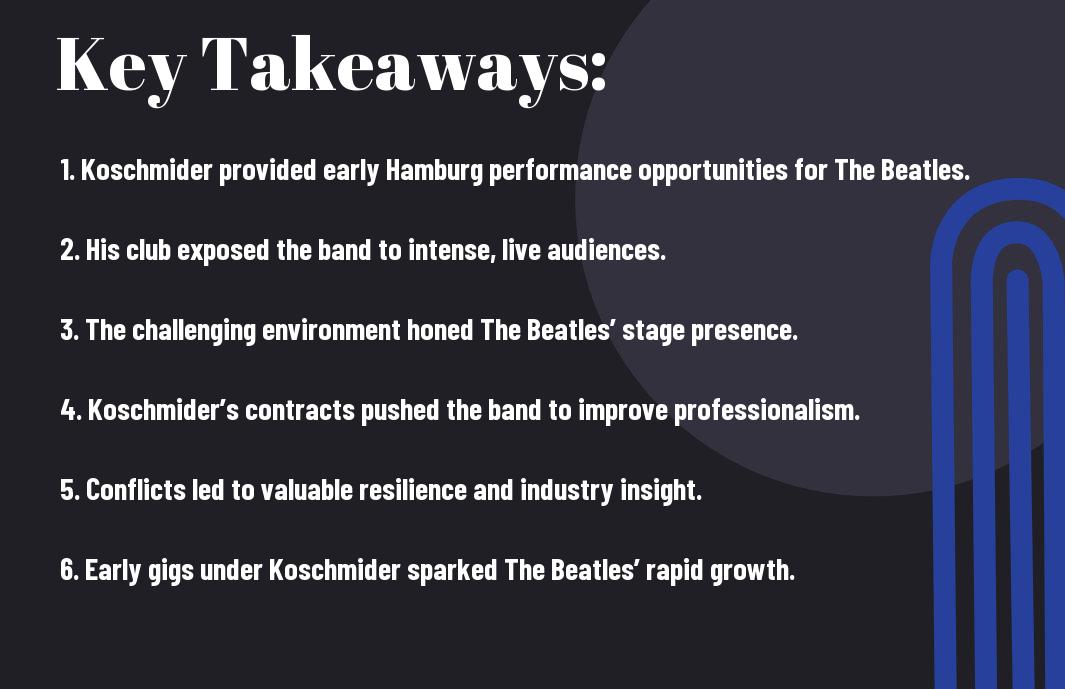It’s necessary to explore into the profound influence that Bruno Koschmider had on The Beatles‘ early career. As a pivotal figure in Hamburg’s club scene, Koschmider provided the band with their first significant exposure to live performance, shaping their musical style and stage presence. However, his strict rules and sometimes harsh treatment introduced them to a gritty reality that would test their resolve. In this post, I will guide you through the complexities of their relationship, revealing both the beneficial and challenging aspects of this formative chapter in their journey.
The Early Years of Bruno Koschmider
Your understanding of Bruno Koschmider’s early years is vital in appreciating his role in the music industry. Born in Germany, Koschmider was deeply influenced by the post-war cultural landscape, where energy and creativity were on the rise. His passion for entertainment and knack for nightlife led him to establish a series of venues that would shape the musical scene, especially in Hamburg.
Background and Influences
Bruno was shaped by the vibrant European music culture of the 1950s, heavily influenced by a mix of American rock and roll, jazz, and local German traditions. His keen interest in music and performance set the foundation for his future endeavors in managing venues that showcased emerging talent.
The Hamburg Scene
At the forefront of the Hamburg music scene, Koschmider operated clubs that birthed numerous bands, including The Beatles. This *raw environment*, characterized by late-night performances and diverse influences, provided a unique platform for musicians to hone their craft and gain exposure. His venues were known for allowing bands to play *multiple sets each night*, nurturing their performance skills and drawing in lively crowds eager for new sounds.
And Koschmider’s establishments, namely the Star-Club and Nightclub Indra, were not just places to play music; they were centers of musical discovery and innovation. Here, artists faced a range of challenges, from fierce competition to the need to adapt quickly to audience preferences. This dynamic environment enabled The Beatles and other bands to cultivate their unique styles, ultimately influencing their trajectories in the music world. The *mix of bright lights*, *energetic crowds*, and *unpredictable nights* made Hamburg a legendary location for rising talent.
The Beatles in Hamburg
Any discussion about The Beatles’ rise to fame must include their transformative period in Hamburg. This vibrant city became the backdrop for their early performances, pushing them to refine their craft while attracting a diverse audience. The unique atmosphere of Hamburg’s nightlife served as a vital training ground, fostering the band’s growth and solidifying their iconic sound.
Initial Engagements at The Indra Club
With their initial gigs at The Indra Club, The Beatles quickly gained attention in Hamburg’s burgeoning music scene. Performing for hours and honing their skills, they captivated audiences while building a reputation that would pave the way for their future success.
The Reeperbahn Experience
With The Beatles performing in the infamous Reeperbahn district, they encountered both the vibrant nightlife and the darker undertones of the city. This experience not only shaped their music but also tested their resilience in a world filled with temptations and challenges.
Due to the *eclectic mix of clubs, bars, and adult entertainment*, the Reeperbahn served as a double-edged sword for The Beatles. While it provided them with *endless opportunities for exposure*, the surroundings were often fraught with *risks*, including *encounters with unsavory characters and the pressure of maintaining a reputation*. Yet, this environment also fostered their creative spark, allowing them to connect with a *wide range of music enthusiasts* and solidify their identity as a band. The lessons learned during this time undeniably contributed to their future successes.
The Business Relationship
Many aspects of Bruno Koschmider’s business relationship with The Beatles shaped their early career. Koschmider, as a club owner in Hamburg, offered them their first opportunity for prolonged performances, which proved significant in honing their skills. However, this partnership was not without its challenges, as the dynamics of their agreement affected both their professional growth and their creative expression.
Financial Arrangements
Before The Beatles found fame, they faced numerous financial arrangements that determined their livelihood. Koschmider offered them a weekly wage, which, while modest, was a lifeline for the struggling band. However, the earnings they made were limited by the terms of their contract and the costs associated with staying in Hamburg, showcasing the financial complexities that often accompany artistic endeavors.
Artistic Freedom and Constraints
Against the backdrop of their Hamburg performances, The Beatles navigated a landscape filled with both artistic freedom and constraints. While Koschmider allowed them to play various sets and experiment with their sound, he also imposed limitations that forced them to cater to the club’s expectations. This juggling of artistic expression and commercial viability was a defining characteristic of their early days.
Considering the environment created by Koschmider, I recognize that The Beatles experienced a unique mixture of freedom and limitations. On one hand, their performances allowed them to explore diverse musical styles; on the other, Koschmider’s expectations restricted their creative choices. This tension between artistic exploration and financial necessity was not merely a side effect of their relationship—it fundamentally shaped their identity and paved the way for their later success. Navigating these constraints forced them to adapt and innovate, ultimately laying the groundwork for their legendary status in music history.
Impact on Musical Development
Not only did Bruno Koschmider provide The Beatles with their first major break in Hamburg, but he also significantly influenced their overall musical development. The intense, nonstop performances in dimly lit clubs forced the band to refine their sound and adapt their style to meet the demands of the energetic audiences. This environment fostered a sense of experimentation and boldness in their music that would later define their career.
Performance Skills Enhancement
Development in performance skills during their time under Koschmider was rapid. The rigorous schedule of playing several hours a night taught The Beatles not only to engage their audience but also to hone their technical abilities. Each performance demanded they push their limits, leading to the dynamic stage presence and musicianship that would captivate fans worldwide.
Influence on Songwriting
Along with honing their performance skills, the intense atmosphere in Hamburg had a profound effect on The Beatles’ songwriting. The mixture of diverse musical influences and the energy of late-night gigs inspired them to craft compelling melodies and innovative lyrics that resonated with a wider audience.
Enhancement of their songwriting abilities became evident as they drew from various genres they encountered in Hamburg, including rock, jazz, and even local German music styles. This exposure allowed them to develop a unique sound that incorporated catchy hooks and relatable themes. The pressure to create engaging material for their sets resulted in the writing of iconic songs that showcased their ever-growing artistic vision and creativity. Ultimately, this period helped lay the groundwork for their future success and lasting legacy in popular music history.
The Breakaway from Koschmider
All good things must come to an end, and the Beatles’ relationship with Bruno Koschmider was no exception. As they transformed from a struggling band in Hamburg into aspiring rock icons, it became imperative for them to distance themselves from Koschmider’s control, paving the way for their subsequent success.
Reasons for Departure
Any number of factors contributed to the Beatles’ decision to leave Koschmider. Among these were growing tensions with him, the desire for artistic freedom, and the need to break away from his restrictive management style. As their ambition blossomed, the Beatles realized that remaining under Koschmider’s influence would stymie their path to greatness.
The Transition to Greater Success
Before venturing into their explosive rise, the Beatles knew that stepping away from Koschmider was necessary for their evolution as a band. This pivotal moment allowed them not only to explore their own sound but also to seek opportunities in the vibrant Liverpool music scene.
Even in this transitional period, the Beatles made significant strides by embracing new influences and networking within their hometown. They secured influential gigs, which marked the beginning of their meteoric rise. The dissolution of ties with Koschmider opened doors for creative freedom and allowed them to cultivate their unique identity. This shift ultimately led to their subsequent fame, drastically changing the trajectory of their careers and paving the way for future hits that would captivate audiences worldwide.
Legacy of Bruno Koschmider
After examining Bruno Koschmider’s influence, it becomes clear how foundational his role was in shaping the early career of The Beatles. His keen business acumen and understanding of the music scene helped pave the way for the band’s success. I invite you to learn more about how these career choices affected John Lennon and the pivotal events of that time in my article on Career Choices, John Lennon, and that “other” Pivotal ….
Recognition and Historical Significance
Along with his direct impact on The Beatles, Koschmider’s contribution to the music scene has earned him a place in history. His foresight and entrepreneurial spirit created an environment where young bands could thrive, leading to a vibrant music scene in Hamburg that significantly shaped popular music as we know it today.
Influence on Future Bands
Beside his direct influence on The Beatles, Koschmider’s legacy extends to subsequent generations of musicians. His approach to artist management and promotion offered a template that many aspiring bands would later emulate, driving the evolution of the music business itself.
Consequently, his methods inspired a wave of acts in the 1960s and beyond, urging them to embrace live performances as a rite of passage. His commitment to nurturing raw talent encouraged future bands to adopt similar strategies, where gigs became a testing ground for artistic development. Koschmider’s legacy can be seen in how artists today still value grassroots performances, underscoring the importance of experiences similar to those The Beatles had under his guidance. His contributions remind us that every great band stands on the shoulders of those who believed in them first.
Conclusion
Hence, understanding the impact of Bruno Koschmider on The Beatles’ career allows us to appreciate the foundational experiences that shaped their evolution as artists. By examining his role in providing them with opportunities in Hamburg, I have come to realize how these formative years influenced their musical direction and resilience. You can see that without Koschmider’s influence, The Beatles’ journey might have taken a different trajectory, highlighting the intricate connections between their early experiences and their later success.












